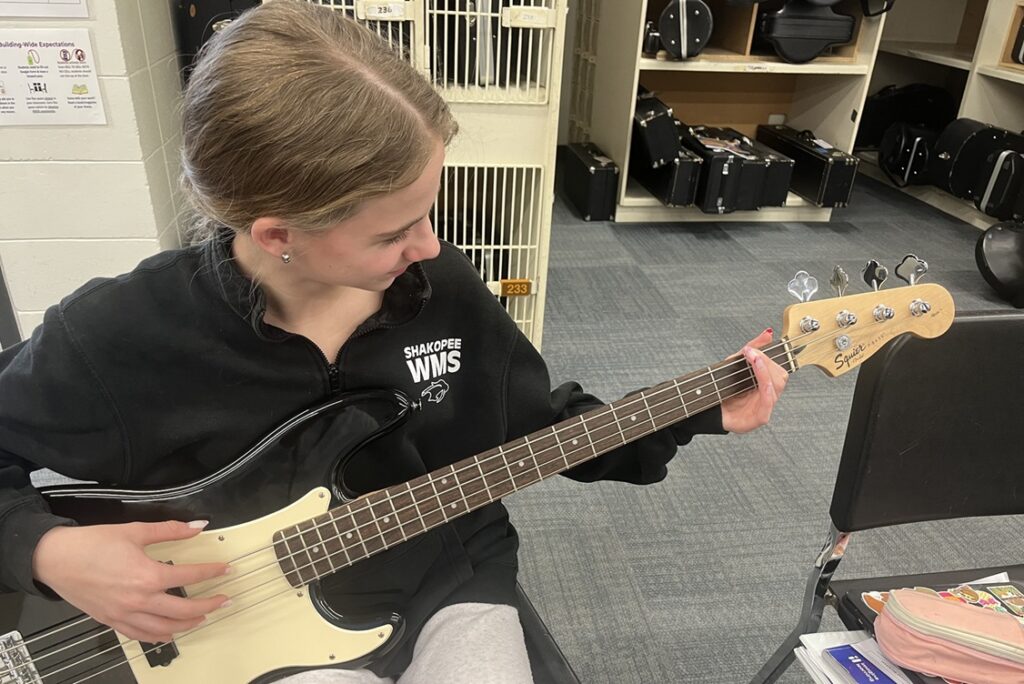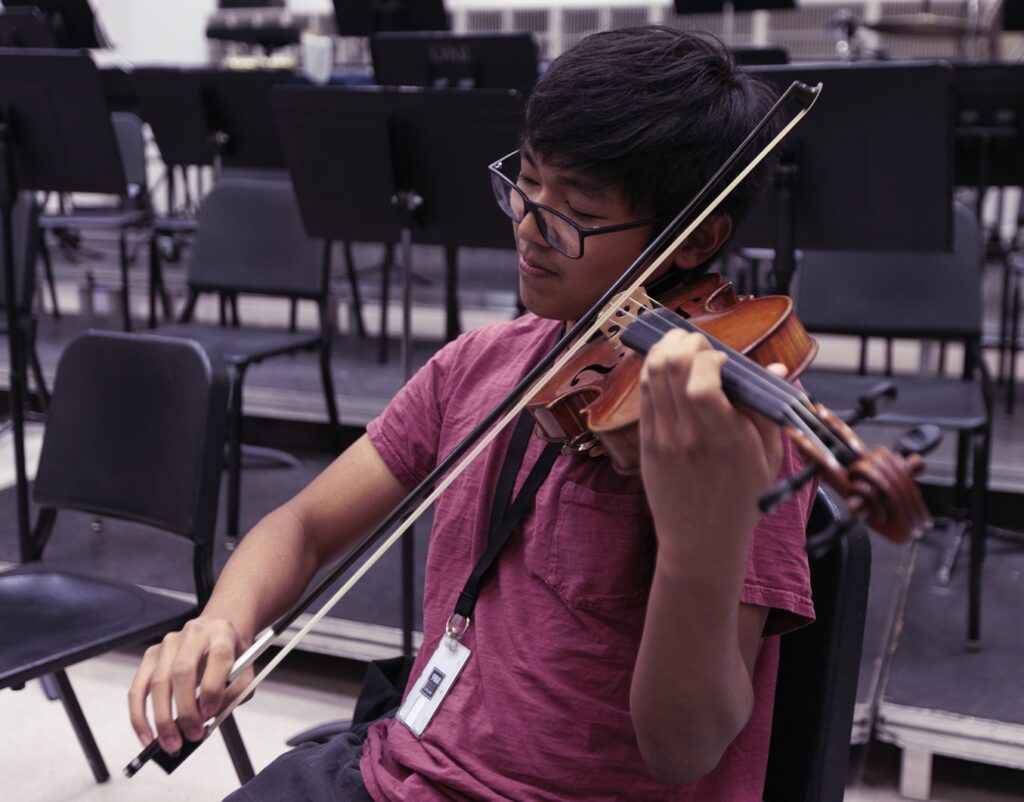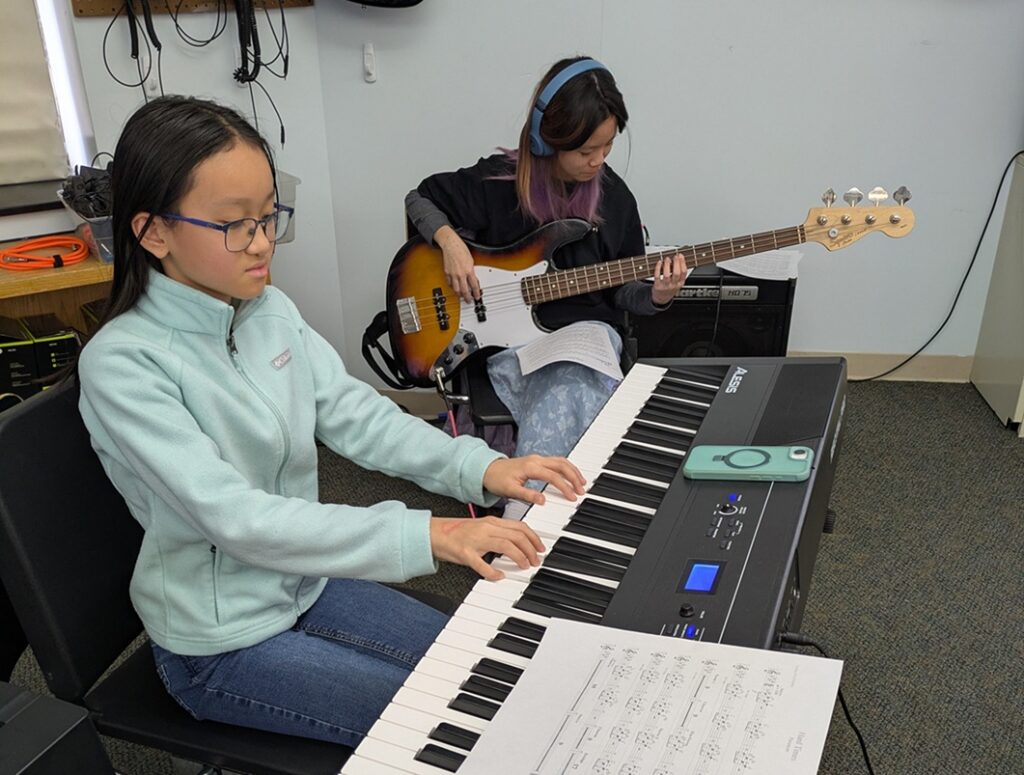Changing Jobs, Part 2: Interviewing Tips
Interviewing for a job is stressful. Try these tips taken from a music educator’s experiences as an interviewee and as an interviewer.
Interviewing for a job can be stressful, especially during the early years of your career. Below are some tips taken from my experiences as an interviewee and as an interviewer.
You Don’t Have to Memorize Anything
I brought notes and printouts with crucial information highlighted when I interviewed for jobs. This allowed me to refer to important school information, such as mission statements and goals. This info sheet included some information about me, including career highlights and meaningful experiences relevant to the position. You would think you could speak about yourself and your accomplishments off the top of your head, but in the heat of the moment, it’s easy to become flustered.
I also recommend having the school report card printed out so you can share some fast facts about your school and the music program (read my article, “Dig Deeper: How to Read Your School Accountability Report Card”).
When answering questions, you can refer to your notes and the school accountability report to help refine and clarify your responses.
Keep Busy
Some great advice I received was to keep busy during the interview. A notebook and a pen allow you to have something to do with your hands — take notes! — during the interview. This shows that you are taking the interview seriously, and you can jot down the answers to any questions you might have had.
Also bring a bottle of water, which is yet another thing to do with your hands if you get nervous. This also allows you to have an excuse to take a “dramatic pause” before answering a question.
 Have Your Elevator Pitch Ready
Have Your Elevator Pitch Ready
Almost every single job I’ve interviewed for began with “so, tell us about yourself.” Early on, I gave them my life story, goals, aspirations, dreams, favorite sports teams, social security number and my thoughts on the recent episode of whatever TV show I was watching. Later on, I streamlined this to relevant information that was true to me. Your answer doesn’t have to be the most creative or unique thing ever. It just has to be true.
Here’s my current answer: “I’m Don Stinson. I’m a music educator in the Chicagoland area. I have the drive to work with students and parents to help provide musical experiences that we could otherwise not do on our own. My focus is to help all students push themselves from wherever they are. My background and experience help students from low-income and underserved backgrounds push themselves toward success. I’m here today because I’m highly interested in discussing how my skillset and experiences could fit into your program, school and community.”
If you have a fascinating fact about yourself that you can pepper in, go for it. This can show some personality and set you apart. I once helped out with a choir performance in California and met Julie Andrews. This is a fun one to include, especially if any music teachers are on the committee.
Call Back on Your Experiences
During an interview, you will be asked several situational questions — what you would do in certain situations. If you’ve had an experience relevant to the question, you can refer to what you did (or what you wished you did!).
However, if you’re a new or newer teacher, you may have to answer hypothetically. Consider starting off with, “in this situation, I would…” and then respond. There’s a good chance that you will get questions regarding parent organization groups and out-of-school trips if you’re interviewing for a music teacher position. Questions regarding conflicts with colleagues with more experience have often come up as well. These are certainly points to ponder when preparing for the interview.
Then there are the questions that really threw me for a loop where I didn’t have a past experience to refer to, nor did I think about the situation as a hypothetical before the interview. So, I was honest and told the committee my process. I said that I wasn’t sure exactly what I would do in this particular situation, but my initial reaction would be to refer to the school’s policies. I would then seek out a colleague and administrator to help with my decision before acting. This was an elaborate way of saying, “I don’t know, but I will take steps to find out.” The committee was satisfied with this answer.
Remember, You’re Not Going to Live on Your Own Island
You’re interviewing to be a part of the overall teacher community in the school. Some music teachers like to be separate from the rest of the school, living on their own island. Education is better when we work together, and administrators see value in candidates who will do their best for the music program while thinking about the school’s overall mission. When discussing your vision for a music program, talk about how you and the program can fit into and benefit the entire school.
Only Tell Them What They Need to Know
Avoid being too forthcoming with details that are not relevant and won’t work in your favor.
Interviewer: “Don, tell us about one of your weaknesses.”
Me: “Well, sometimes I lose an entire night’s sleep because right when I’m about to doze off, I remember how I called my 5th-grade teacher ‘mom’ by accident, and the entire class laughed at me. I then think about this for six to eight hours, slowly pulling the bed covers over my head more and more.”
Interviewer: “Excuse me?”
Me: “My mistake. What I meant to say was ‘conducting.’ I’m always working on improving my non-verbal communication.”
A ridiculous example? Absolutely. But not too far off from what I’ve seen in some interviews. Openness and personality are great but staying on topic is essential during the interview process.
Be Up to Date on Current Focuses
In 2021, you should be up to date on social and emotional learning (SEL), hybrid learning and diversity, equity and inclusion (DEI). I hesitate to call these “trends,” but the reality is that education is constantly changing, and what is today’s focus will likely shift in the upcoming school years. When you interview for a job, it’s assumed that you can teach and describe your content. However, many interview committees will ask questions about current focuses in education. When in doubt, refer to the school’s mission statement or look up the school board minutes to view recent presentations and topics that are important to the district.
Don’t Expect Anyone to Ask for Your Materials — Rather, Reference Them
I’ve had interviews where I brought a portfolio of my work. It was a beautiful binder that had evidence of almost everything significant in education that I had done.
No one looked at it.
This happened multiple times. Eventually, I learned that I had to be the one to reference my portfolio. If I could elevate one of my answers with a piece of evidence, I would then take it out of the binder and show it off. Then, the committee was interested in looking at the rest of my materials.
Some other advice I received was simply asking to leave your portfolio with the committee at the end of the interview. “I’d like to leave this portfolio so you can take a look at some other programs and methods that have benefitted my students. I can reach out in a week to an administrative assistant to pick this up.” In most instances, I got my portfolio back during a second-round interview.
YOU Are also Interviewing THEM!
Don’t forget — the interview isn’t just about them asking you questions. It is also about you and finding out where you fit best. Ask questions, and if you need some follow-up, ask more questions. There have been jobs that I wasn’t particularly interested in, but I took the interview anyway. I found out through the interview process that the position would be an excellent fit for me. I’ve also found the opposite — jobs I thought that I really wanted, but then red flags came up during the interview process.
Figure out what is important to you when looking for an employer. At the start of your career, you probably just want a job. But as you gain more experienced, and if you decide to look for other positions, you can begin vetting potential employers. I’ve always heard that it’s easier to get a job when you already have a job. This absolutely turned out to be true for me. Having the security of an existing job helped me feel more comfortable and confident and allowed me to be more honest in what I was looking for in another employer.
Create Questions Based on the Music Program AND the School
Have questions prepared and ask them! I’ve never walked away from a job interview without asking some questions (read my article, “Changing Jobs, Part 3: Questions to Ask Potential Employers.”
Start by using data points from the accountability report of the school that you are applying to. When you create questions, you are coming from a place of curiosity and seeing how you can grow, learn and offer your own skillset to this program and school. Avoid coming from a place of judgment. Some schools may appear to be underperforming on paper in academics, for example. Don’t ask, “Why is the majority of the school failing math?” Rather, rephrase the question to: “What interventions are in place for struggling students, and how can the music teacher best support these school initiatives?” Then, move on to questions regarding the music class or program.
If you’re a new teacher, asking “can new teachers serve on faculty committees” shows a genuine interest in wanting to be a part of the entire school culture. Just be careful — if you offer something up during the interview, the school and administration will likely take you up on it!
From a strategic standpoint, asking questions gets the interview committee talking. You simultaneously learn about the position and school while also getting a break from answering questions yourself!
I typed up and printed out my questions when I interviewed for jobs. I had this sheet handy during the interview process and took notes on it because chances are that some of your questions will be answered during the interview process. This helped me to avoid being redundant. I had a few interviews early on where I was nervous and didn’t write much down. I looked pretty silly asking a question that the committee had already spoken about earlier in the interview.
I’ve found that 10 prepared questions work well. Once you have your questions, consider organizing them from most to least important. Then, select the question you will ask last (your closer). During the interview, three or four questions will probably get answered. When it’s your time to ask questions, select three. Take notes on the answers and ask any quick follow-up questions if necessary. Finally, ask a closing question that makes it clear that your are interested in the position.
Ask for the Job
Do you want the job? Then ask for it!
At the end of the interview, consider a closing statement. It can be short (“Thank you for the opportunity to interview. I hope I have made it clear that I would love to be a part of this learning community”) or a little more detailed (“Thank you so much for meeting with me today. I was especially impressed by your dedication to including the music program alongside other academic disciplines in the school. If I were to be fortunate enough to work for your school and community, when would I be able to begin preparing?”).
 Practice, Practice, Practice
Practice, Practice, Practice
Just like practicing an instrument, the more you interview, the more comfortable you will become with the process.
Find time with a trusted colleague or two to practice your interview skills. My best friend and I would help each other out by cold-calling each other when we were interviewing. I would randomly get a call from him, asking, “Mr. Stinson, this is generic music program calling you for an interview. Please tell me how you might incorporate new techniques to include all types of learners in your performance music classroom.” I would answer, he would say “thank you” and hang up. Later that day, I’d get another call from him with some feedback.
In-person practice can help immensely. I’ve always had trouble with eye contact and body language. So, for a particularly exciting job prospect, I had some friends run a mock interview for me. The stressful part? I had them seated extremely close to me, and they hit a buzzer every time I broke eye contact for more than a few seconds. This got me on track quickly (although I tricked them a few times by simply looking at a spot on the wall behind them).
Silence is OK
You don’t have to fill every second of silence with words or sounds. When practicing for your interview, take a pause of two to three seconds before answering. This will feel like an eternity at first, but it’s one way to become comfortable with the silence. Think of this in terms of music — have you ever heard a phrase that just had too many notes? Rests are not only OK, but they are necessary! I’ve even asked the interviewer if I could have a few seconds to write down some notes before answering. They were always OK with this. After 20 seconds, I replied with a much more cohesive answer than what was previously in my head.
Saying Thank You
My personal preference is sending a handwritten thank-you note after the interview. However, email is much more timely and reliable when sending a follow-up. I learned from being on committees that there can be a quick turnaround in some cases. Within a few hours of the interview, I would send a quick email to each committee member (how did I remember who was on the committee? I wrote their names down on the notebook I mentioned above). I triple-checked the spelling of their name and sent an individualized email.
Dr. Johnson:
I appreciate the opportunity to interview at your school today. I was especially impressed by the student greeters at the office and how proud they were of their community. I was very interested in this position before, but after meeting some faculty, staff, and students, your school is one that I would be very fortunate to be a part of.
Sincerely,
Don Stinson
Rejection
You put in all of the prep, you practiced and then you interviewed. One of two things will happen — you either get the job, or you don’t. Now what? Either way, you’ve gained interview experience.
Rejection will come in a few different ways. In some instances, you’ll receive an email or a phone call saying, “thanks, but no thanks.” If there is an opportunity to ask some follow-up questions, by all means do so, but focus on yourself. Don’t ask questions about other candidates. Hiring processes are usually strict and confidential, and employers open themselves up to legal trouble if they say certain things. You can certainly ask, “Do you have any feedback for me that I could use for future job interviews?” or “Was I missing certain skills or experience that would have been beneficial for this position?”
Rejection may also come in the form of silence. I’ve been on the receiving end of this before, and it’s not fun. Two weeks went by after an interview, and I didn’t hear anything. I knew deep down that I didn’t move on in the process but had trouble accepting it. Eventually, I heard on social media that another candidate had moved on.
Although I wish that every hiring committee would contact candidates with a “yes” or “no,” the reality is that many committees don’t. Most committees have a timeline in place but avoid calling or emailing their final candidate(s) until at least a few days after this deadline. Remember, while the interview and hiring decision are essential to you, the callback goes down the administrator’s to-do list when something like a fire drill or contact tracing comes up.
Rejection hurts at the moment. You’ll have questions and maybe some anger or self-doubt. I do a little planning ahead of time. If I get the job, I’ll go out to dinner. If I don’t get the job, I would still go out to dinner. Either way, I treat myself not for success or failure but rather as a resolution.
Acceptance
On the other hand, you get a call saying, “Congratulations! We’d like to offer you a position in our school district!” If you are dead set on this position and have all of the information you need, it’s an easy decision!
Otherwise, consider saying thank you and asking if you could have some time to think before accepting. You may get a little pushback from an administrator who wants to get a candidate to the upcoming board meeting, but if you are not 100% sure, take the time to consider. This is your time to ask for clarification on years of service credit, benefits, schedule, etc. Then, once you’ve mulled it over, you can call the school back with your decision. If it’s a yes, it’s an easy phone call to make. If you decide that the school is not a great fit for you, a simple “thank you, but at this time, I’m going to have to respectfully decline the offer” will work.
Do you have other tips or recommendations on interviewing for a job? Email them to us at educators@yamaha.com.
Read the other articles in the Changing Jobs series — Part 1: Tips to Improve Your Resume, Part 3: Questions to Ask Potential Employers and Part 4: Things No One Tells You About Switching Jobs.















